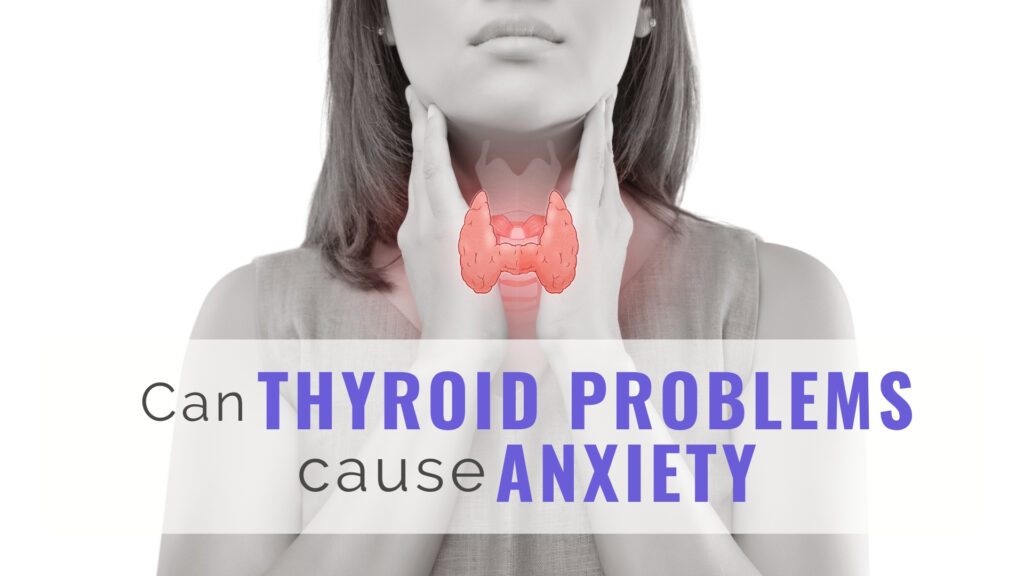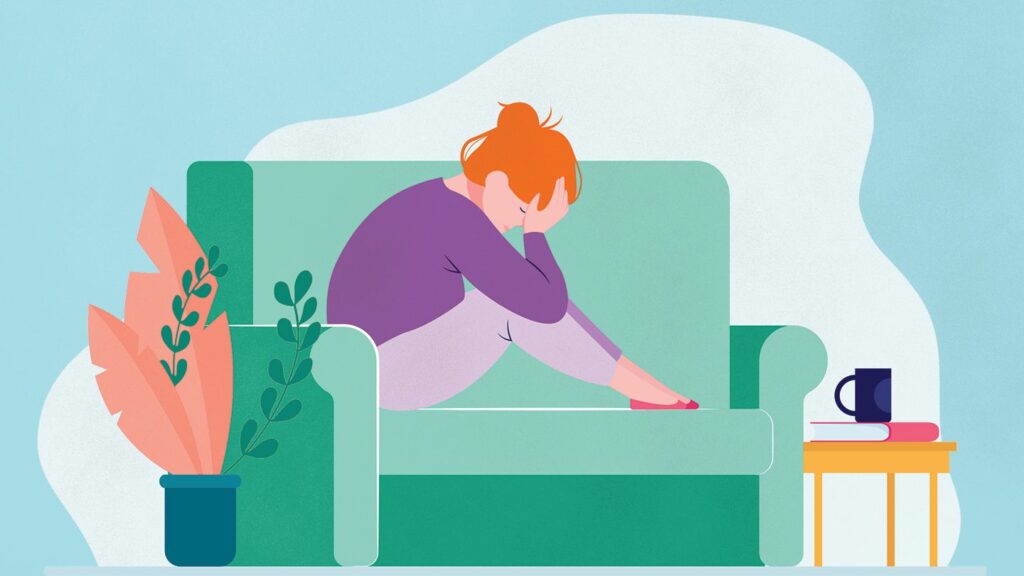It is no secret that there is a strong relationship between thyroid and anxiety. An estimated one-third of all patients with anxiety disorders also have some form of thyroid dysfunction. While the two conditions are separate and distinct, they often occur together. If you are struggling with both thyroid problems and anxiety, it is important to understand the relationship between the two to get the best treatment possible.
Contents
What Is Thyroid?

The thyroid is a butterfly-shaped gland located in your neck, just below your Adam’s apple. The thyroid’s job is to make thyroid hormones, which are secreted into the blood and then carried to every tissue in the body. The thyroid hormone helps the body use energy, stay warm, and keep the brain, heart, muscles, and other organs working as they should.
The disease thyroid is one of the most common endocrine disorders, which means it affects the body’s hormone levels. According to the National Institutes of Health, more than 20 million Americans have some form of thyroid disease, and up to 60 percent of them don’t even know it.
There are two main types of thyroid disease: hypothyroidism and hyperthyroidism. Hypothyroidism, or an underactive thyroid, is when the gland doesn’t make enough thyroid hormone. Hyperthyroidism, or an overactive thyroid, is when the gland makes too much thyroid hormone.
What Is Anxiety?
Anxiety is a normal emotion that we all experience at one time or another. It is often described as feeling nervous, worried, or uneasy about something. For some people, however, anxiety can be much more than just an occasional inconvenience. It can be a disabling condition that prevents them from living a normal life.
Anxiety is also one of the most common mental disorders. According to the National Institute of Mental Health, more than 18% of adults in the United States suffer from anxiety. That means that millions of people are dealing with anxiety daily.
There are many different types of anxiety disorders, each with its own set of symptoms. Some of the most common include generalized anxiety disorder, social anxiety disorder, and panic disorder.
What Is The Relationship Between Thyroid And Anxiety?

The relationship between thyroid and anxiety is not fully understood. However, there is some evidence that suggests that an imbalance in thyroid hormone levels can contribute to anxiety.
For example, one study found that people with hypothyroidism were more likely to experience anxiety than those without the condition.
Another study found that people with Graves’ disease, an autoimmune disorder that can cause hyperthyroidism, were more likely to experience anxiety and other mental health problems than those without the condition.
Some studies found that people with anxiety disorders are more likely to have an imbalance in their thyroid hormone levels.
It is not clear if an imbalance in thyroid hormone levels causes anxiety or if anxiety leads to an imbalance in thyroid hormone levels. There may also be other factors involved, such as genetics or stress.
While the exact relationship between thyroid and anxiety is not clear, there is some evidence to suggest that an imbalance in thyroid hormone levels can contribute to anxiety. If you are experiencing anxiety and think that your thyroid may be to blame, it is important to talk to your doctor so they can assess your situation and provide appropriate treatment.
Common Impacts of Thyroid and Anxiety
There are many common impacts of thyroid and anxiety. The most common impact of thyroid and anxiety is that they can both cause physical symptoms. These physical symptoms can include fatigue, headaches, muscle aches, and difficulty sleeping. Thyroid and anxiety can also both cause mental health symptoms. These mental health symptoms can include irritability, worry, and depression. In some cases, thyroid and anxiety can also lead to more serious problems such as heart disease or diabetes.
Some of these impacts can be of particular concern for women. For example, women with thyroid problems may experience irregular menstrual periods, fertility problems, or an increased risk of miscarrying a pregnancy. Women with anxiety may also be at a greater risk of developing postpartum depression.
Sometimes these impacts can be adverse and result in a vicious cycle. For example, someone with a thyroid disorder may develop anxiety as a result of their physical symptoms. Then, the anxiety can make the physical symptoms worse. This can then lead to more anxiety and so on. It is important to seek help from a healthcare professional if you think you may be experiencing any of these impacts.
Common Treatments for Thyroid and Anxiety

There are many common treatments for thyroid and anxiety. Some people may need medication to treat their anxiety, while others may require surgery to remove the thyroid gland. Many people with anxiety disorders also benefit from therapy or counseling.
Some common treatments for anxiety disorders include:
One of the most common and effective treatments for anxiety disorders is cognitive behavioral therapy (CBT). CBT helps people learn to identify and change the thoughts and behaviors that contribute to their anxiety.
Exposure therapy is another common treatment for anxiety disorders. Exposure therapy helps people face their fears in a controlled and safe environment. By gradually exposing themselves to their fear, people can learn to control their anxiety and eventually overcome it.
Medication
Several types of medication can be used to treat anxiety disorders. The most common type of medication is an anti-anxiety medication. These medications help to reduce the symptoms of anxiety by slowing down the nervous system.
Anxiety can also be treated with relaxation techniques such as yoga, meditation, and deep breathing exercises. Relaxation techniques can help to calm the mind and body and reduce the symptoms of anxiety.
Exercise
One of the best ways to reduce anxiety is to get regular exercise. Exercise releases endorphins, which have mood-boosting effects. It also helps to reduce stress and improve sleep.
Diet
Eating a healthy diet is also important for reducing anxiety. Eating plenty of fruits, vegetables, and whole grains can help to reduce stress and improve your overall health.
Herbal Supplements
Several herbal supplements can be used to treat anxiety. Some of the most common herbs include valerian root, chamomile, passionflower, and lemon balm. These herbs can help to calm the mind and body and reduce the symptoms of anxiety.
Conclusion
Thyroid and anxiety are two very common conditions that can occur together. Although there is no definitive answer as to whether or not one causes the other, there is a clear relationship between the two. If you suffer from both thyroid and anxiety, it is important to seek professional help to manage both conditions effectively.
To get help for your thyroid, schedule an appointment with a doctor or endocrinologist. You can also talk to your regular doctor about your symptoms and ask for a referral to a specialist. If you suffer from anxiety, there are many resources available to help you manage your condition. Talk to your doctor about your options and look for support groups in your area. With proper treatment, you can effectively manage both thyroid and anxiety.
Hope this article was of help to you! If you are suffering from mental health disorders, you may seek help from Therapy Mantra. We have a team of highly trained and experienced therapists who can provide you with the tools and skills necessary for overcoming mental health disorders. Contact us today to schedule an online therapy or download our free Android or iOS app for more information.


